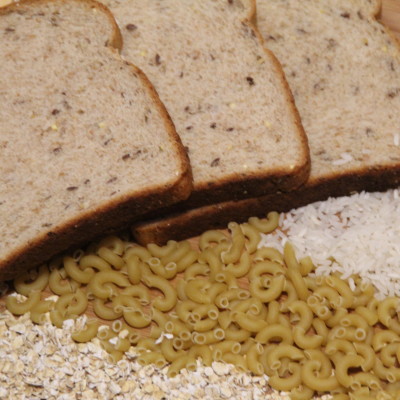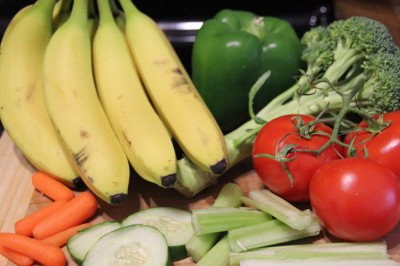
There are many rumblings out there about carbs – Carbs are the devil! Carbs are making you fat! Carbs are inflammatory! But what’s true and what’s just hype?
First, what are carbohydrates?
Carbohydrates are chemical compounds composed of carbon, hydrogen, and oxygen (CH2O – 2:1 hydrogen to oxygen molecules). They are one of your three macronutrients, along with protein and fat. Carbs are a major source of energy within the body- they are stored as glycogen in the muscle tissues and liver, and are converted to glucose when your body needs energy. Your brain and central nervous system need glucose for fuel, they will start to catabolize muscle if there’s not enough glucose in your system.
There are 3 types of carbohydrate (though you may have heard them referred to as Simple and Complex):
- Monosaccharides – the simplest carbs, containing one sugar group, eg. glucose (blood sugar) or fructose (fruit sugar).
- Oligosaccharides – short chains of monosaccharides, eg. sucrose (table surgar), maltose (malt sugar), lactose (milk sugar). These can be quickly absorbed into the bloodsream through the intestinal lining and have a quick effect on blood sugar levels. Energy is quickly produced, but only lasts a short time.
- Polysaccharides – long chains of monosaccharides, eg. starch, dextrins, glycogen, cellulose, pectin, fibers. These comprise 90% of all naturally occurring carbohydrates. These carbs take longer to digest, and this creates a slower increase in blood glucose and insulin levels.
When you eat a carbohydrate, the enzymes in your mouth (and then the enzymes in your small intestine) break down complex sugars into simple sugars. From there, they travel to your liver where some glucose is used for energy transfer, some is stored as glycogen, and the rest is sent to your cells as glucose via your bloodstream. If your glycogen stores are full, glucose can be stored as fat.
You just said glucose can be stored as fat, so carbs will make me fat and I should stop eating them, right?
Some things to keep in mind:
Vegetables are carbohydrates. Vegetables are not bad for you. Also, digesting vegetables is a high-energy process, which requires glucose. And many veggies contain dietary fiber, which encourages gut motility (and also takes glucose to perform). If you’re counting carbs, don’t count your veggies.
Athletes need glucose to fuel activity. The body can only store approximately 1,500-1,800 calories of glycogen (the name for stored glucose). When the intensity of your activity demands more glucose than is available in the bloodstream, glycogen stores are used as an energy source. Having adequate glucose in your bloodstream and full glycogen stores ensures that your body won’t start to turn to protein as an energy source. Without enough glucose in your system, your body will start breaking down protein into glucose, and then the protein can’t serve its primary role in muscle growth and repair. Also, your brain needs glucose, without it, focus, performance, and mood suffer.
From Precision Nutrition:
“We now know that eating too low-carb for too long can cause significant disruptions to many hormones. This seems especially true for women, whose bodies may be more sensitive than men’s to low energy or carbohydrate availability (perhaps because of the evolutionary importance of having enough body fat and nutrients to sustain a pregnancy).”
But which carbs should I eat?
In addition to the veggies that you should already be eating, whole, unprocessed carbs offer a multitude of benefits to your body – they are high in fiber, slow to digest, full of vitamins and help us to feel full.
The trouble with carbs is that many of us have a hard time distinguishing whole grain, unprocessed carbohydrates from the processed ones (and grain marketers certainly aren’t making it any easier!).
It’s tough to name unprocessed carbs off the top of your head, right? Here are a few that you’re probably not eating often enough:
- Plain full flake or steel cut oats
- Plain amaranth
- Plain quinoa
- Plan millet
- Plain barley
- Plain wild rice
When looking for whole carbs that will offer you the fuel you need, the gycemic index is a decent place to start. The glycemic index is the relative degree of blood sugar elevation in the 2 hours after eating 50g/carb – it measures how quickly and significantly your blood sugar level rises. For example, High GI – candy, sugar, cereal, bagels; Low GI – legumes, nuts, high fiber grains, vegetables. Folks tend to overeat high glycemic index foods because both the energy and feeling of fullness they provide are shorter-lived than low gycemic index foods.
Make the bulk of your carb intake whole, unprocessed, low-glycemic carbs, as well as fruits, nuts, legumes, and vegetables.
When should I eat these carbs?
You are most insulin-sensitive and your muscle glucose uptake is enhanced after vigorous activity – so the best time to eat starchy carbs is after you exercise. Again, look to whole carbs and fruit to replenish glycogen stores post-exertion, especially if next-day performance is needed, like on tournament weekends.
As athletes, you also want to make sure that those glycogen stores exist pre-performance as well. Even in short bouts of high-intensity activity (like derby), carbs can enhance performance. Eating carbs before exercise and games preserves your liver and muscle gycogen, and helps to prevent protein breakdown.
Don’t be scared of carbs – the right ones are an important part of a balanced diet and a cornerstone of your athletic performance.
For further reading:


 Pre-Hab: How to Engage Your Core
Pre-Hab: How to Engage Your Core  Go From Benchwarmer to MVP with the 1% Secret
Go From Benchwarmer to MVP with the 1% Secret  How to Improve at Derby’s 27 Laps Test
How to Improve at Derby’s 27 Laps Test  Stop sucking. Start winning.
Stop sucking. Start winning.  Cross-Training for Roller Derby: A Primer
Cross-Training for Roller Derby: A Primer
cool is there anything that would be a good thing to eat if you have 2 games in one day?
would there be enough time to digest food if there is only a 2/3 hr gap between games or would you rekon a ginormous breakfast would be the way to go and maybe a small snack in between? i’m not a fan of protein shakes… i’d rather eat food than drink shakes. But if that was what was the best i would give it a try! thanks
People like shakes because they’re quick and easy, and you can be confident that you’re getting both protein and carbs to replenish your stores. They’re also really portable for when you’re travelling. For a multi-game day with a focus on whole foods, you could look at something more substantial for breakfast – 1-2oz protein, some fruit, at least one vegetable serving, and a starchy carb – maybe some whole grain oats or a baked potato. For your between game snack – you’d also want 1-2oz lean meat or protein equivalent, fruit – especially bananas, and an easily digestible carb like potatoes, sweet potatoes, or rice. Pick something familiar that makes you feel light and ready for action, nothing too heavy or rich.
This is really helpful, thanks for posting!